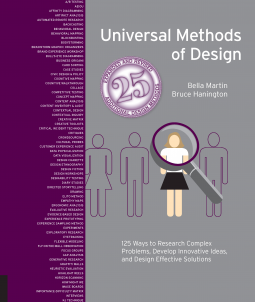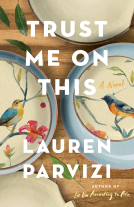
Universal Methods of Design, Expanded and Revised
125 Ways to Research Complex Problems, Develop Innovative Ideas, and Design Effective Solutions
by Bruce Hanington; Bella Martin
This title was previously available on NetGalley and is now archived.
Send NetGalley books directly to your Kindle or Kindle app
1
To read on a Kindle or Kindle app, please add kindle@netgalley.com as an approved email address to receive files in your Amazon account. Click here for step-by-step instructions.
2
Also find your Kindle email address within your Amazon account, and enter it here.
Pub Date 3 Dec 2019 | Archive Date 3 Dec 2019
Quarto Publishing Group – Rockport Publishing | Rockport Publishers
Talking about this book? Use #UniversalMethodsOfDesignExpandedAndRevised #NetGalley. More hashtag tips!
Description
The text and accompanying photos and graphics of this classic resource are delivered in a concise and accessible format perfect for designers, educators, and students. This new, expanded edition includes updated information on scenarios, secondary research, territory maps, and other chapters. The addition of 25 new chapters brings fresh relevance to the text with innovative design methods that have emerged since the first edition, such as backcasting, behavioral design, horizon scanning, and transition design.
Universal Methods of Design, Expanded and Revised distills each method down to its essence, in a format that helps design teams select and implement the most credible research methods suited to their design culture. Each method is presented in a two-page format. The left-hand page contains a concise description of the method, accompanied by references to further reading. On the right-hand page, images and case studies for each method are presented visually. The relevant phases for design application are highlighted as numbered icons along the right side of the page, from phases 1 (planning, scoping, and definition) through 5 (launch and monitor).
Build more meaningful products with these methods and more: Affinity Diagramming, Behavioral Mapping, Bodystorming, Contextual Design, Critical Incident Design, Directed Storytelling, Empathy Maps, Graffiti Walls, Image Boards, Parallel Prototyping, Simulation Exercises, Touchstone Tours, and Weighted Matrix.
This essential guide:
- Dismantles the myth that user research methods are complicated, expensive, and time-consuming
- Creates a shared meaning for cross-disciplinary teams
- Illustrates methods with compelling visualizations and case studies
- Characterizes each method at a glance
- Indicates when methods are best employed to help prioritize appropriate design research strategies
Universal Methods of Design, Expanded and Revised is an essential resource for designers of all levels and specializations.
Marketing Plan
Key Selling Points: With 25 new Methods added to the book, Universal Methods of Design will be of interest even to those readers who have the original edition on their shelves. Universal Methods of Design illustrates each method with compelling visualizations and case studies. Visuals and text make each method of design comprehensible at a glance.
Key Campaign Activity: Design and education pitches
Trade: Finished Advances
Retail: Finished Advances
Consumer: Include in design academic mailings and emails for course use Pitch to design media such as InVision, Co.Design, Photoshop User, Core77, Visual Arts Journal, Idea, Creative Bloq, Surface Leverage contributor online presences and contacts
Available Editions
| EDITION | Other Format |
| ISBN | 9781631597480 |
| PRICE | US$35.00 (USD) |
| PAGES | 264 |
Featured Reviews
 Karen G, Reviewer
Karen G, Reviewer
If you're interested in design and design methodology this is a fantastic resource. With 125 research methods, it's absolutely a comprehensive reference with short explanations and clear examples of each method to ensure you can see the application of each method. I really enjoyed my time with this book and as someone who works closely with the User Experience and User Experience Research teams, I feel like I understand some of the methodology so much more clearly now.
with gratitude to netgalley and quarto publishing for an early copy in exchange for an honest review.
 roxi N, Reviewer
roxi N, Reviewer
I never say I'm a graphic designer -- it's just my background and I like organizing information. I'm definitely not an artist or a scientist, and this book made it quite obvious to me that I barely scratch the surface of design. While intimidating, this book is amazing and easy to digest in pieces (for me). It's a resource book I will use repeatedly until the information finally sticks. It also illustrates just how much science there is in design -- and how design surrounds all of us. The book breaks down the five phases of design are described and methods detailed out. There is a lot of information to digest and is fascinating to see just how complex human behavior is.





